News Blog
Latest News From Our Volunteers in Nepal
VOLUNTEER COMMUNITY CARE CLINICS IN NEPAL
Nepal remains one of the poorest countries in the world and has been plagued with political unrest and military conflict for the past decade. In 2015, a pair of major earthquakes devastated this small and fragile country.
Since 2008, the Acupuncture Relief Project has provided over 300,000 treatments to patients living in rural villages outside of Kathmandu Nepal. Our efforts include the treatment of patients living without access to modern medical care as well as people suffering from extreme poverty, substance abuse and social disfranchisement.
Common conditions include musculoskeletal pain, digestive pain, hypertension, diabetes, stroke rehabilitation, uterine prolapse, asthma, and recovery from tuberculosis treatment, typhoid fever, and surgery.
FEATURED CASE STUDIES
Rheumatoid Arthritis +

35-year-old female presents with multiple bilateral joint pain beginning 18 months previously and had received a diagnosis of…
Autism Spectrum Disorder +

20-year-old male patient presents with decreased mental capacity, which his mother states has been present since birth. He…
Spinal Trauma Sequelae with Osteoarthritis of Right Knee +
60-year-old female presents with spinal trauma sequela consisting of constant mid- to high grade pain and restricted flexion…
Chronic Vomiting +

80-year-old male presents with vomiting 20 minutes after each meal for 2 years. At the time of initial…
COMPASSION CONNECT : DOCUMENTARY SERIES

Episode 1
Rural Primary Care
In the aftermath of the 2015 Gorkha Earthquake, this episode explores the challenges of providing basic medical access for people living in rural areas.

Episode 2
Integrated Medicine
Acupuncture Relief Project tackles complicated medical cases through accurate assessment and the cooperation of both governmental and non-governmental agencies.

Episode 3
Working With The Government
Cooperation with the local government yields a unique opportunities to establish a new integrated medicine outpost in Bajra Barahi, Makawanpur, Nepal.

Episode 4
Case Management
Complicated medical cases require extraordinary effort. This episode follows 4-year-old Sushmita in her battle with tuberculosis.

Episode 5
Sober Recovery
Drug and alcohol abuse is a constant issue in both rural and urban areas of Nepal. Local customs and few treatment facilities prove difficult obstacles.

Episode 6
The Interpreters
Interpreters help make a critical connection between patients and practitioners. This episode explores the people that make our medicine possible and what it takes to do the job.

Episode 7
Future Doctors of Nepal
This episode looks at the people and the process of creating a new generation of Nepali rural health providers.

Compassion Connects
2012 Pilot Episode
In this 2011, documentary, Film-maker Tristan Stoch successfully illustrates many of the complexities of providing primary medical care in a third world environment.
From Our Blog
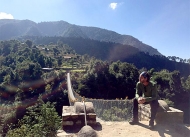
- Details
- By Jesse Jory

Nepal for me was a practice in being comfortable with the feeling of groundlessness.
Have you ever been on a suspension bridge?
Nepal, I came to learn, is full of suspension bridges. My experience as a volunteer acupuncture physician was analogous to crossing a suspension bridge. After our first week arriving at camp we had our first Saturday off. It was decided that we would take hike into the local mountains to visit a village. The day was perfect, the sky clear and we were all excited to venture out and explore. We visited the villagers high in the mountains of Suping overlooking Bhimphedi. Our trusted guide Tsering informed us we would be crossing a suspension bridge on our decent back down. I immediately began to have anxiety as I have a fear of suspension bridges. That feeling of groundlessness gave me a pit in my stomach and sweaty palms as we started our decent and got nearer to the bridge.
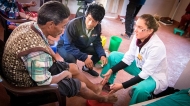
- Details
- By Paula Rashkow
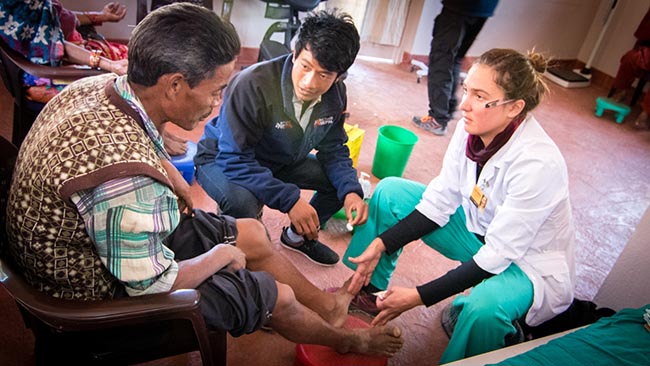
There was definitely a special something in the air that Saturday night. We had just had a fantastic day off from clinic visiting the home of one of our rock star interpreters. As we wove through farm fields and villages, the other practitioners and I fell in and out of many conversations about what we have been observing of rural life in Nepal. Bottom line: It is hard work. We were constantly trying to figure out what kind of recommendations would be useful and realistic for these folks who farm the land of the Himalayan foothills. So much of what we see in clinic is basic wear and tear from years of walking these hills with heavy loads and the back breaking labor it is to subsistence farm without the mechanization we are used to in the west. We also see lots of COPD from cooking over open fires in the home with no chimney to ventilate, eyes becoming scarred and irritated from so much dust and sun exposure, and trickier issues of lots of GERD from an irregular eating regimen, unmanaged diabetes and hypertension all probably due to modernizing processed diet over the past few decades.
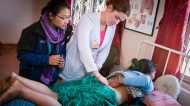
- Details
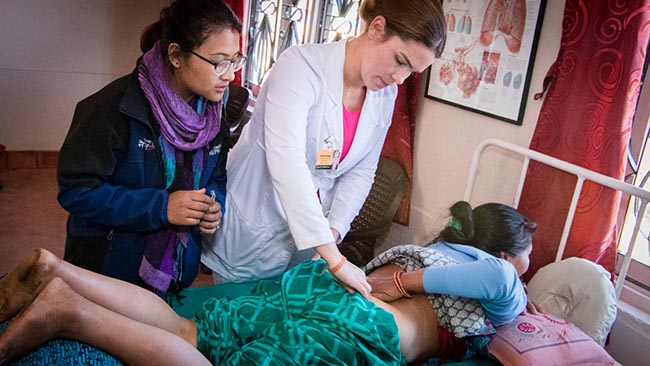
Has anyone ever seen the movie, or read the book The Hunger Games? I know it is a teen drama but I am not sorry to say I have done both, and rather liked them. The story of the Hunger Games itself is definitely fantasy, but one scene does tend to pop into my head from time to time while I am here in Nepal. The scene when the two poor kids from district 12, get taken to the capitol to have a feast. The kids are in awe that people have so much money, and spend their money on things like fashion, waxing, elaborate and ornate everything. While they are at the feast there is more food than they could possibly imagine, never before have they seen so much food, and people who can eat so much. Then a small vial of liquid comes around, and a citizen of the capital tells them that this liquid is to make them throw up, so that they can continue to eat more. That scene is basically the epitome of indulgence. The reason this scene tends to come to mind while I am in Nepal, is not because that movie poses any semblance of reality at all, but it serves as a stark juxtaposition of extreme poverty, and extreme overindulgence.
Our Mission
Acupuncture Relief Project, Inc. is a volunteer-based, 501(c)3 non-profit organization (Tax ID: 26-3335265). Our mission is to provide free medical support to those affected by poverty, conflict or disaster while offering an educationally meaningful experience to influence the professional development and personal growth of compassionate medical practitioners.
